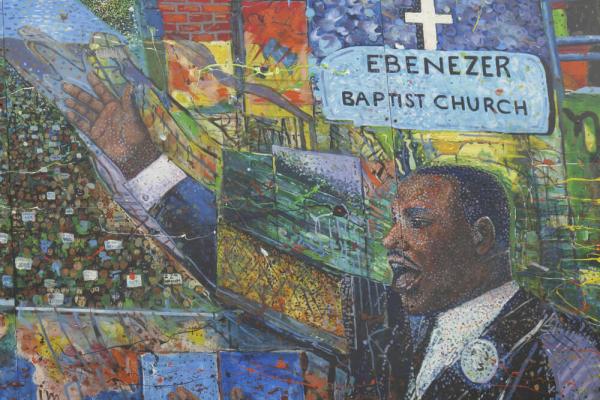Almost anyone engaged in religious life in the United States is familiar with the concerning trend of declining religious affiliation. Especially among younger people, already more than half don’t identify with any religion and that number is expected to double in the next 30 years.
I personally know the life-saving possibilities of religious community. When I was a child, growing up in a tumultuous home, it was my Sunday school teachers who created a space of joy and love in my life that gave me hope and a glimpse of what other homes could be like.
Over and over again, I encounter examples like this. Congregations can be places of transformation in small and large ways. When they are able to create meaningful communities, they unlock possibility and hope in people’s lives. They help us imagine something better for our world.
It is Unitarian Universalism that taught me courage from a young age. It taught me to take risks for what is right, to not be afraid to speak for my values, even if it means being a lone voice. It continues to teach me to love fearlessly, abundantly, and boldly and to remember the life-saving power of joy and community.
How then do we explain the religious drop-off, the crisis of faith? Is it that I am just particularly inclined to the offerings of religion? No. I would venture to say that we are living in a very particular time that requires a very particular practice of faith in order to be relevant. Unitarian Universalism gave me a special gift in this regard, it gave me a religion that made it clear that the work of justice is inseparable from a faith rooted in love.
Sixty years ago, Dr. Martin Luther King, Jr. warned us:
If the church does not recapture its prophetic zeal, it will become an irrelevant social club without moral or spiritual authority … If the church does not participate actively in the struggle for peace and for economic and racial justice, it will forfeit the loyalty of millions and cause [people] everywhere to say that it has atrophied its will …
I know his words to be true. I’ve seen how mission in a congregation gets undermined by internal power struggles and personality politics. I’ve seen congregations too comfortable in the privilege of the status quo. But I’ve also seen the impact a congregation can have in the lives of its people and in the larger community when it puts mission and a calling to justice at its center.
King didn’t just warn against atrophy, he offered:
If the church will free itself from the shackles of a deadening status quo, and, recovering its great historic mission, will speak and act fearlessly and insistently in terms of justice and peace, it will enkindle the imagination of [hu]mankind and fire the souls of men [and women], imbuing them with a glowing and ardent love for truth, justice and peace.
What is at stake in the conversation regarding the decline in religious life is not just the future of our faith institutions but the future of humanity. We are living through a time just as Dr. King described, where reactionary forces seek to double down on the failing status quo through the rhetoric of scarcity, isolation, and walls. In response, a prophetic faith kindles the imagination of humanity helping us to create new pathways to respond to the challenges of our time that are rooted in not in fear, but in possibility and the values of justice and peace.
The challenges before us as a nation are quite literally life and death – for black and brown people, for immigrants and refugees, for women, trans, and gender non-conforming people, for Muslims and Jews, for children and people living with disabilities, and for the poor - the list of people under threat and losing their rights just grows.
Our relevance as religious communities in this time is based on how we respond to these challenges. In the face of an onslaught of injustice and loss, religious communities can be a way of fighting back against despair and acquiescence, not with a mollifying promise that everything will be alright but by providing hope and courage.
The powerful, active hope that my faith offers is found in the fact that despite the reality of our circumstances, we still have some choice in how we will show up, how we will act, where we will give, and how we will love.
Our communities can and need to be places of authentic connection and collective inspiration. Places where we can bring our heartbreak, our anger, our fear, and be held and renewed in a community of love and joy. Worshipping communities of real spiritual depth that help us glimpse the possibility of who we can be as human beings so that we might show up in our lives every day with our humanity.
Whether we are providing that safe space for a child who needs a break from a troubled home or sanctuary for a family facing deportation and fighting desperately to stay together, examples of this relevant, vibrant, life-changing faith abound.
In response to the Kavanaugh hearings and the #MeToo movement, Unitarian Universalists offer our “Our Whole Lives” education materials to teach healthy sexuality, the sacred beauty of the spectrum of sexual orientation and gender, and most importantly 100% consent, 100% of the time. In reaction to the Pulse Nightclub massacre, our local church became the staging area for trauma responders, a place where people could receive pastoral care and where disaster responders could find respite.
What we do every day as people of faith matters. How we each live our lives with the understanding that we are part of a larger beloved community has impact. When our institutions turn away from that reality, when we remain silent, comfortable in privilege, in the face of attacks on democracy, on voting rights, on vulnerable populations, it is no wonder that we are not sought out as relevant sources of ministry, power, and healing. To recover our prophetic zeal, our great historic mission, and to be to be the conscience of this country and never its tool, that is our calling. May we answer it together.
Got something to say about what you're reading? We value your feedback!







